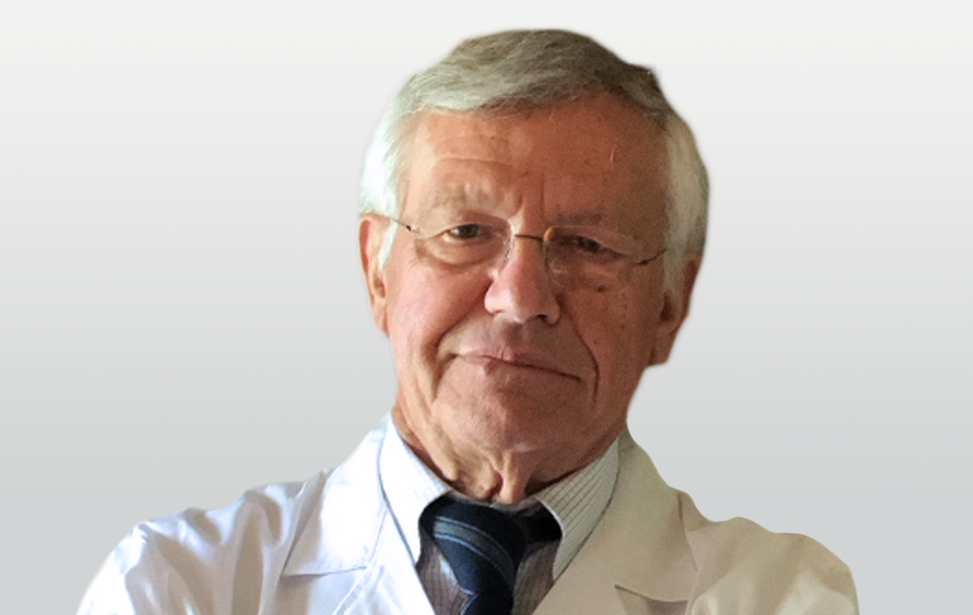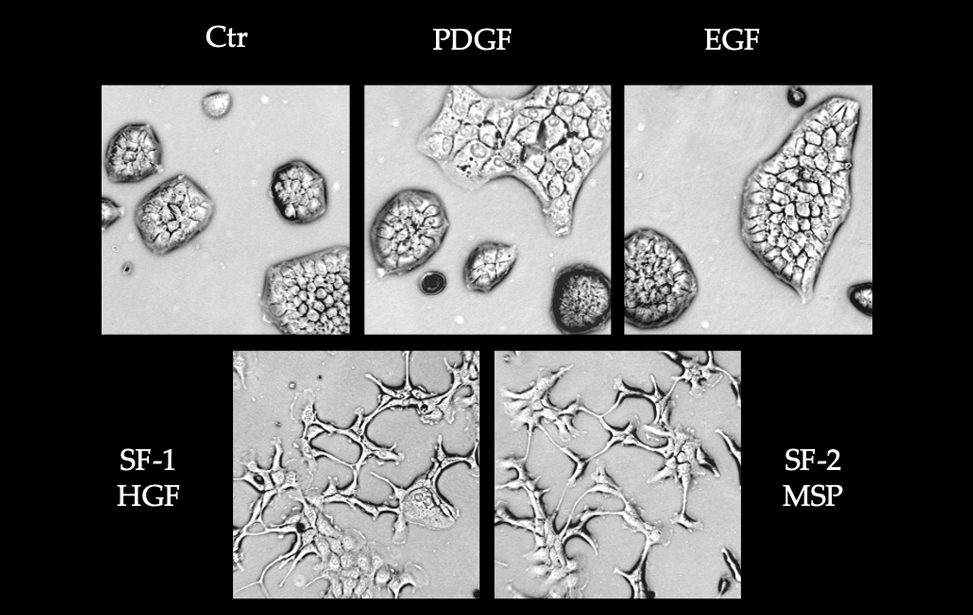
Paolo Comoglio
Paolo Comoglio has a long and distinguished record in the field of research on tyrosine kinase receptors and related oncogenes . He developed the first anti‐phosphotyrosine antibody; through this tool he identified the kinases encoded by oncogenes such as ABL, MET, RON and ROR. Paolo Comoglio expounded and introduced a number of insights that are now largely accepted and widespread, notably the concept of ‘invasive growth’, a genetic program -driven by MET- otherwise ‘physiological’ but ‘usurped’ by cancer cells to progress toward metastasis. The program includes hypoxia, promoting tumor invasiveness, and venous thrombosis, a long‐sought link between cancer and thrombo‐embolism. He recently discovered that MET inhibition overcomes radiation resistance of glioblastoma stem cells and that withdrawal of therapeutic tyrosine kinase inhibitors accelerates disease progression by unleashing the ‘flare effect’. The invasive growth program is now under investigation in a previously unrecognize syndrome known as CUP (Cancer of unknown primary)

Research interests
Cancer of unknown primary (CUP) is an elusive clinical and pathologic entity comprising metastatic tumors that are diagnosed in the absence of a clinically detectable primary lesion. CUPs are characterized by (i) an early and unpredictable metastatic pattern, and (ii) an undifferentiated phenotype not referable to any organ/tissue of origin. CUPs are relatively rare (3- 5%) but, owing to their aggressiveness and lack of therapeutic rationale, are an unsolved clinical problem. CUPs represent a quintessential metastatic disease, whose understanding can shed light on the largely obscure genetic, molecular and biological principles governing cell dissemination and homing throughout the organism in all cancer subtypes. In CUPs the invasive and undifferentiated phenotypes -distinctive of 'cancer stem cells'- are tightly associated and possibly concomitantly regulated, and the underlying genetic/molecular mechanisms might represent the Achille's heel of metastasis. By a robust, multi-disciplinary and integrated translational platform, we intend to (i) deeply characterize the genomic landscape of CUPs, to discover case-specific and common genetic dependencies and functional vulnerabilities; (ii) characterize the molecular basis sustaining the undifferentiated, stem and invasive traits shared by CUPs; (iii) challenge potential 'drivers', emerged from genetic and functional annotations, as targets for personalized medicine. These top-down efforts are complemented by hypothesis-driven, bottom-up approaches, leveraging on the long- standing experience of the research team in the functional characterization of MET oncogene and Semaphorin/Plexin family as drivers of invasive growth, angiogenesis and metastasis, as well as regulators of the cancer stem cell phenotype.
Pubblicazioni
- Comoglio PM, Trusolino L, Boccaccio C.
Known and novel roles of the MET oncogene in cancer: a coherent approach to targeted therapy.
Nat Rev Cancer. 2018 Jun;18(6):341-358. doi: 10.1038/s41568-018-0002-y. PMID: 29674709. - Vigna E, Chiriaco C, Cignetto S, Fontani L, Basilico C, Petronzelli F, Comoglio PM.
Inhibition of ligand-independent constitutive activation of the Met oncogenic receptor by the engineered chemically-modified antibody DN30.
Mol Oncol. 2015 Nov;9(9):1760-72. doi: 10.1016/j.molonc.2015.05.007. Epub 2015 Jun 5. PMID: 26119717; PMCID: PMC5528712. - Boccaccio C, Comoglio PM
MET, a driver of invasive growth and cancer clonal evolution under therapeutic pressure.
Curr Opin Cell Biol. 2014 Dec;31:98-105.doi: 10.1016/j.ceb.2014.09.008. Epub 2014 Oct 8. PMID: 25305631. - Boccaccio C, Luraghi P, Comoglio PM.
MET-mediated resistance to EGFR inhibitors: an old liaison rooted in colorectal cancer stem cells.
Cancer Res.2014 Jul 15;74(14):3647-51. doi: 10.1158/0008-5472.CAN-14-1088. Epub 2014 Jul 1.PMID: 24986519. - Vigna E, Comoglio PM.
Targeting the oncogenic Met receptor by antibodies and gene therapy.
Oncogene. 2015 Apr 9;34(15):1883-9. doi: 10.1038/onc.2014.142. Epub 2014 Jun 2. PMID: 24882574.
Group members
Post doc
Altintas Dogus MuratTemporary Fellow
Cerqua Marina(update: June 2022)